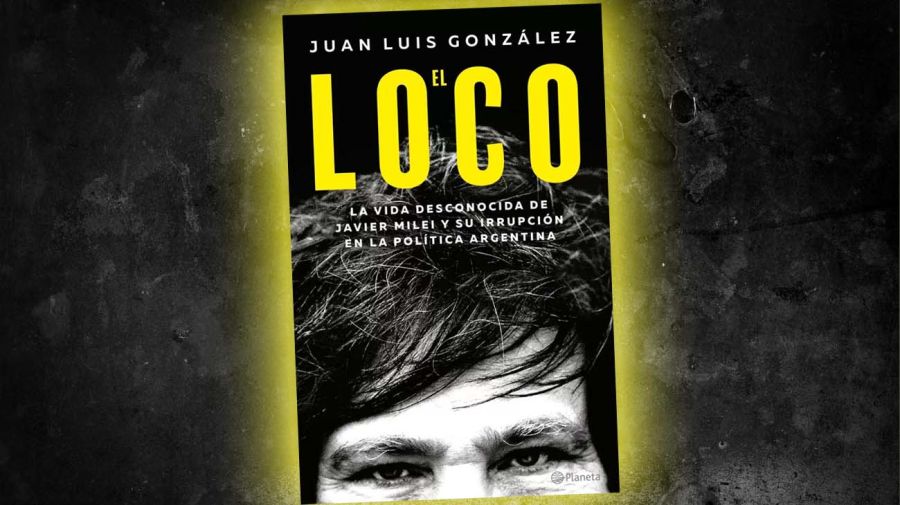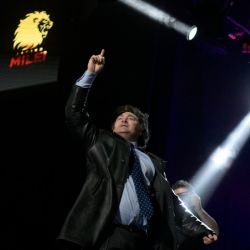Javier Milei is going to win, of that he is convinced.
He says that it was God Himself – one of the supernatural presences with whom he began to interact after the death of his dog/son Conan in 2017, the moment marking the beginning of his mystical journey – who told him that he is destined to a “mission” to save Argentina from “evil.” With that powerful conviction Milei faced his electoral challenge as if it were barely a further step in a story already written in Heaven.
But although it sounds weird, Milei is right. Proving that the deputy really is the chosen “Number One,” as he calls it, exceeds the scope of this article (in my book El Loco*, further revelations may be found), but at another level the economist was right on the button. He’s going to win because he has indeed already won.
Let’s get down to the brass tacks. His La Libertad Avanza alliance is barely two years old. It was born as a novel project beyond the logic of Argentina’s famous ‘la grieta’ rift, bringing together liberals, libertarians, conservatives, pro-lifers, ultra-nationalists and influencers – a rainbow alliance interpreting the mood of the times very well.
At its head is Javier Milei. He’s an extravagant figure, with a past as a media-savvy economist projecting ideas which sound new and which, combined with the right dose of insults and shouts and that particular style of unkempt hair, transformed him into a practically irresistible personality. His name brings television ratings and social network clicks, an ideal combination for the era of WhatsApp, Twitter, and Instagram videos (he is the Argentine politician with the most followers online, ahead of Cristina Fernández de Kirchner and Mauricio Macri). If Brazil had Jair Bolsonaro and the United States had Donald Trump, many see Milei as the Argentine incarnation of the two.
The combination of Milei and La Libertad Avanza, added to the indices of inflation and the debacle of the Frente de Todos coalition straight after Macri’s Cambiemos administration, produced something totally out of the box. A list just six months old, whose leader had not even participated in a university election, with a high percentage of militants without any political experience, managed to win 17 percent of the votes in the 2021 midterms in the heart of the country, the place that has produced the last two presidents. La Libertad Avanza won two seats in the lower house Chamber of Deputies, five in the Buenos Aires City Legislature, one in the La Rioja Province Legislature and another the following year in the province of Tierra del Fuego.
Milei and La Libertad Avanza also achieved something more intangible but much more important, check-mating the balance of forces between Fernández de Kirchner and Macri, the unalterable landscape of Argentine politics since 2007. Milei became the ghost haunting the profitable game of la grieta and, with the subtlety of a punch in the jaw, shifted the axis of all discussions. The privatisation of all state companies, the dollarisation of the Argentine economy, the declaration of war against progressive, feminist and “gender” ideologies, the destruction of the Central Bank, the total elimination of public works, freeing the right to bear arms, the abolition of the minimum wage, denial of the figure of 30,000 disappeared by the 1976-1983 military dictatorship, the extreme defence of market freedoms and “liberty”– these have all come to form part of the common currency of political ideas.
The libertarian lawmaker has transformed taboo issues into television subtitles, media headlines and applause on social networks with so much ease and success that he has obliged everybody to pay attention to his almost magical formula. The parvenu has passed from pupil to teacher in a matter of weeks and something more: he has served notice that there is a “cultural battle,” an invisible war for civic common sense on Argentine soil. And which he has been winning thus far.
Seized by panic due to his growth and, above all, an exodus of votes, Juntos por el Cambio gave a sharp turn of the wheel, doing what Spain’s Partido Popular had done with the eruption of Vox – forced by the appearance of a big fish in the same pond, they migrated their discourse to much harsher stances. Their ‘hawks’ became more hawkish than ever, yelling like Milei, incorporating their arguments and picking fights with the same enemies.
“Nobody pushes my discourse around, whether progressives or cynics, I cannot stand them any longer, where the hell are the priorities?” said Macri when presenting one of his books in October 2022. That was the same leader who liked to look in the mirror of Barack Obama and European social democrats when he reached the presidency. It was also his first insult in public in his entire political career. “The yells, the insults do not speak of me, they speak of you,” Macri had declared as he opened congressional sessions for the last time as president, while Kirchnerite deputies goaded him from their benches. Three years later the insults and yells continue without speaking of Macri: they speak of Milei and the lack of hawkish responses to his appearance in politics.
For the opposition coalition’s ‘doves’ the challenge was even tougher. Delivering the wing’s great arguments, like dialogue and healthy democratic coexistence, concurred with the new fashions and ideas was a task worthy of contortionists. Horacio Rodríguez Larreta, the leader of that sector, had to leave his comfort zone to float opinions in which he obviously did not believe. For example, City Hall passed from dictating workshops about inclusive language for its employees and publishing sexual health flyers to using the letter ‘X’ to prohibit inclusive language in schools in June, 2022. Rodríguez Larreta, in person, passed from agreeing with the taxation of empty housing (October, 2021, in an interview with Ernesto Tenembaum and Jairo Straccia) to “not supporting a tax on empty housing” (October, 2022, in an interview with Luis Novaresio).
Peronism, on its side, followed with attention these flutters in the heart of the adversary, despite initially taking Milei as hardly more a joke when he first entered the political arena. But after that 17 percent, the historic movement began to take the libertarian into account, debating whether to raise him up as the great bogeyman in politics and thus devalue the Macri camp, or imagining him as a tactical ally in the future to guarantee the robbing of votes from the opposition.
This year Peronist mayors throughout the country have been passing around an imaginary cheque-book on how much it would cost to finance a local candidate with the approval of Milei to compete within their list while the governors provided financial or logistical aid for the liberal’s candidates in their province. In the midst of a political and economic crisis of Frente de Todos’s making, the libertarian – and the votes snatched from Juntos por el Cambio – promises to be an indispensable ally in their bid to maintain power.
“We’re imploring Milei to win many votes, that speaks of how much we have lost our way,” said Fernando ‘Chino’ Navarro, an official of President Alberto Fernández’s government, in a burst of sincerity during a recent interview. In some cases, this idea went further. The case of Tigre, where Economy Minister Sergio Massa’s wife Malena Galmari raided the La Libertad Avanza list of municipal councillors and defined the top candidate (as those expelled denounced to Noticias magazine) is good evidence of that.
Milei has done much to shake up the landscape by planting himself at the centre of the agenda, obliging all the actors to follow his pace and transforming himself into a player with possession of the ball. He has thus provoked a tsunami for all rules, rewriting Argentine politics and transforming words like “taxation,” “dialogue,” “state” and “progressive” into sins which only the valiant dare to pronounce, while “liberty,” “liberalism,” “caste” and insults of every kind have come to be hit slogans with voters. Historic Peronists, Radicals of various generations and stripes, confessed Macri fans and repentant Kirchnerites have all wiped away their pasts with an elbow and have begun to proclaim themselves lifelong liberals with the intention of improving their numbers in the social networks and opinion polls.
For all these reasons Milei has already won. Not just because of his phenomenal election performance, installing issues, rewriting the agenda and transforming the other two major coalitions. The libertarian is little more than the outstanding personality of an Argentina exhausted by years and years of economic and political crisis. The phenomenon exceeds him, although he gives it its face.
* Juan Luis González is the author of El Loco, a biography of Javier Milei.
** El loco: La vida desconocida de Javier Milei y su irrupción en la política argentina by Juan Luis González is published by Editorial Planeta.




























Comments